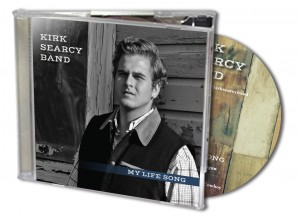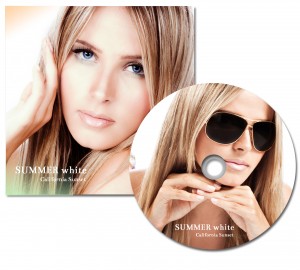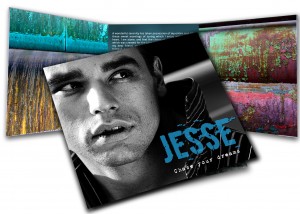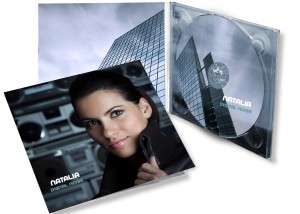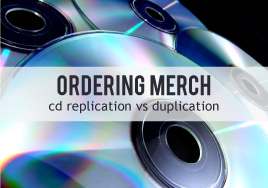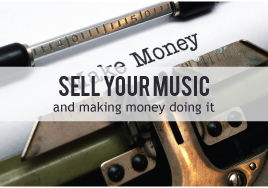Choosing the Right Packaging for Your Band’s CD
By Estimated reading time: 7 minutesDisc Packaging Options
When you go out to eat, you expect the food you order to be good. But if it shows up in front of you looking sloppy, with sauce dripping off the edge or a fingerprint in the roll, you’ll probably suspect that the quality of the food is on par with the poor presentation.
The same can be said for your music. If you’ve spent long, meticulous hours perfecting your newest album only to throw it on a poorly packaged CD, those who see it won’t anticipate a quality product inside. Make sure you put the same amount of care into creating your CD packaging as you have the music itself. To do that, it’s important to know what your options are.
Jewel Cases
Ten years ago, jewel cases were the go-to option. Nearly every music CD was sold in them, and for good reason. Their clear cases let the artwork shine, there was room for multi-page inserts, and the structure of the hard plastic case protected the CD itself. If you’re like us, you have stacks of CDs in jewel cases lying around somewhere.
But, unless you already have artwork designed for this format and find it difficult to change, you probably don’t want to order this package for your music project. Think back to those stacks of CDs in jewel cases… how many of them have cracks on one side, are scratched, or are missing one (or both) of the hinge tabs that keeps the front attached? How much space do they take up, for how few CDs? Is that what you want to lug around from one gig to another, not to mention pay shipping on? What is the fan experience like if their jewel case is broken or all scratched up? Don’t stacks of CDs in jewel cases send you right back to 1989?
Jewel cases might have been the standard; while they still sell surprisingly well, they’re bulky, fragile, and a little outdated… maybe they aren’t the best choice for your project.
CD Sleeves
This envelope-style packaging is a very simple and basic way to protect the CD. They get the job done and are very cost-efficient, but they’re not super special. With only the front, back, and disc face, there is little room for extra artwork or information.
If you’re wanting to engage and connect with your fans, sleeves could work, but they’re not the best option. If you’re super concerned about saving space (like, you’re flying out for an overseas tour and can only take one bag and your instrument), then they might be a good choice. CD sleeves are also a solid choice for sending demo CDs to promoters or venues, since your press kit will have other material about your band.
Wallets
A step up from sleeves, wallets are another all-cardstock packaging option for CDs. However, they offer artists a lot more flexibility with design and the amount of information that can be included than sleeves do, since they commonly come in four, six, and eight-panel options with one, two, three, or four pockets and up to four discs. They also take up very little space (slightly more than a sleeve does).
If you’re worried about space and durability but want to offer your fans more than the very-basic sleeve, wallets might be your answer.
Digipaks
Digipaks are the ideal combination of practical materials, flexible design choices, and that little touch of special that your fans want. These factors help explain their surge in popularity over the last few years.
Unlike jewel cases, digipaks are made of cardstock, meaning they won’t break nearly as easily as the plastic jewel cases. This also makes them a bit more eco-friendly, if that’s your thing. (If so, note this: Digihubs, which replace the plastic tray with a rubber hub, take the green thing a little farther.) Depending on the size of your digipak, they also take up roughly half the space that jewel cases do—a bonus if you’ve got a van full of bandmates, instruments, snacks, and merch.
Where digipaks really shine is their flexibility in design. You can order them in four, six, or eight panels and they can hold up to seven discs. If you add a slit or pocket, you could even add a standard insert or booklet on top of that. Think of all the lyrics, liner notes, credits, and stories you could share with your fans in that space, of the extra band photographs and graphics you could include. No more deciding between thanking your wife or your grannie for supporting your passion; thank them both. In fact, thank everyone. And tell that story about that one gig and your drummer. You know the story.
Not only do digipaks allow more room for artwork, photographs, and text than jewel cases or sleeves, but they allow room for more media. You can include multiple CDs or turn your merch into a CD/DVD combo, with a recording of a live show or “behind the scenes” video of the recording process. This upgrades your item from a standard, run-of-the-mill CD to a keepsake.
What About Cost?
We get it. You’ve spent money on instruments, maybe some lessons, band promotions, your website, the recording studio, touring, and so on. Being in a band can be expensive, and buying CDs can involve parting with a big chunk of change. So, let’s look at the costs*. Really.
Jewel Cases: For 1000 replicated discs with the most basic two-panel, full color jewel case available (with over wrap), the cost is $878, or $0.878 per CD.
Digipaks: For 1000 replicated discs in Six-panel digipaks (with over wrap), the cost is $1,036, or $1.036 per CD.
Look at the cost per package. For the same quantity and method of production, the price between the different packages varies by about $.16, just a little more than a dime. A dime. Think about your fan. What would they rather have: a two-panel jewel case or a six-panel digipak? You have a great opportunity to make the best first impression possible by giving your fan the superior digipak packaging. They will appreciate your extra effort, and you have the opportunity to use the design space on the six-panel digipak to tell more of your band’s story. Everyone wins.
Remember, you’ll probably be selling your CD for at least $10. If you include extras (like a second CD or a DVD and a booklet or insert) and use top-of-the-line materials, you can bump that price up a little more. Even at $10 each, one CD sale covers your cost of almost 10 CDs, even if you choose nicer packaging like the six-panel digipak. Another way to think of it – you make 85% to 90% profit on every disc you sell. Nothing else on your merch table generates this kind of profit.
Picking the Right Packaging for Your Band
As far as packaging goes, really consider your options. Again, think about your immediate needs. Are you traveling and short on space? Is the CD going in a press kit? Or is this going out to fans? Then think about the difference that $.16 can make in the product you offer your fans, and the difference it can make in how those fans view your product and your band. Is it going to cause frustration for you with toting it to gigs, or for fans as it breaks and takes up shelf space? Is it going to strengthen your fans’ connection to your band and become something they treasure?
After all the time and money you’ve invested in creating the perfect sound, it would be a shame for that work to be overshadowed by sloppy or even just average presentation. Because when it comes to selling merchandise, presentation really does matter.
* All prices are taken from our parent site, www.nationwidedisc.com. Prices do not include shipping.
See also: Ordering Merchandise: CD Duplication vs. Replication, How Many CDs Should I Purchase for a First Release?
5 Comments
...Keep Reading

